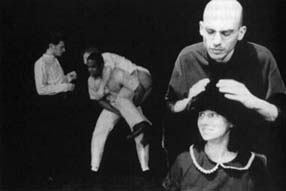
- Performing Arts Journal May 1998
- de Volkskrant May 25, 1998
- de Volkskrant May 25, 1998
- Le Soir May 25, 1998
- Le Soir May 25, 1998
- Performing Arts Journal November 1997
- Performing Arts Journal November 1997
- Salzburger Nachrichten August 13, 1997
- Salzburger Nachrichten August 13, 1997
Some Sort Of Awakening (Abridged)
by Mark Zimmerman
As if laying a critical foundation for the discussion of modern theatre (I speak, of course, of true modern theatre, as opposed to the Corporate Real Estate Conglomerate Production), Octavio Paz wrote, “In order to decipher a hieroglyph, a writer’s only recourse is signs (words) that immediately form another hieroglyph.” Conversely, Henry Miller wrote that “we realize the function of the theatre is not to hand us back the everyday familiar reality, but to give us intimations of a super reality which knows no bourne.” Both statements — naked, fecund with awareness — offer us translations of the theatrical statement. In short, if I may: theatre should distill the arrangement of languages and bring us a momentum of artistic reverie or exaltation. By its very nature theatre should communicate and transcend; the banal becomes glorious, the heroic tragic and suspect.
[text about The Wooster Group’s House/Lights]
Cab Legs, presented at Performance Space 122 in New York and venues in Europe, showcases the free-ranging talents of an intensely physical theatre, at once cryptic and relevant, referential and stoic. Contriving a kind of universal comedy, Elevator Repair Service, a collaborative of writers and performers (including Steve Bodow, John Collins, Bradley Glenn, Rinne Groff, James Hannaham, Blake Koh, Leo Marks, Katherine Profeta, Scott Shepherd, Clay Shirky, Susie Sokol, and Colleen Werthmann, some of whom have worked with the The Wooster Group) exploits a sublime minimalism to turn attention to the swirling undercurrents of the performers’ various idiosyncracies and body language. In this age of “post-everything,” this would still seem to be at least one of the goals of any group aspiring to create theatre. But where such acclaimed writers as Mac Wellman contort language into a nonsensical hash, Elevator Repair Service achieves moments that funnel meaning and story to an apex of expression not by tossing aside language and dialogue, but by enmeshing delicate glimmers of speech within a framework of often brutish motion that recalls body art. Co-directed by John Collins and head writer Steve Bodow, Cab Legs tells the story of the wayward Dr. John Biltmore, gambler, womanizer, drinker, prodigal son returning to a small town and to his father’s tradition-bound medical practice. As portrayed by Scott Shepherd, young Biltmore lounges and grimaces through a bravely existential role. This is the young man of learning who, it could be said, has learned too much. Enamored of the neurotic Linda (Rinne Groff), a woman who is dominated by her insecurities, her senile mother (Susie Sokol) and puritanical father Reverend Calloway (Jonathan Feinberg), Shepherd’s Biltmore is a study of ambition gone wrong, the ambition of another, carried like an albatross.
But this is a comedy. Groff’s performance presents Linda as strongly emotional; as Linda riffs maniacally on the greatness of the medical profession, she drags the audience into a disturbing whirlpool of obsession and desire. A strange sexual sub-current emanates quite perfectly from Linda; she is the woman longing to escape, but without the tools (emotionally, mentally) to do so. Linda’s ability to hold us so raptly comes from an embarrassed alliance she blindsides us into; we are laughing at the same woman we’ve seen at uptown parties, the same woman we share breakfast with (for one reason or another) in the dim mornings after an unusual drunk. Physically, Shepherd, Sokol, and Feinberg dominate the stage with sheer, if anguished, confidence. Shepherd’s slouch is a thing of impeccable grace, exhibiting a very American nonchalance. Sokol keeps things moving even over the sexually laden exchanges of silence with her inventive, understated movements. Like Sokol, Feinberg draws attention to the unspoken through use of an understated presence; the blink of an eye could hold the drop of tragedy we seem to await.
The choreography by Katherine Profeta derives from the dance rituals of contemporary Indian film; the dances in these movies are substitutions, flowery metaphors for things that cannot be shown, substitutes for modes of sexual engagement. They are exaggerated moments, time extended and suspended as the emotional state of the forbidden action is explored. Since everything can be shown on the American stage, these moments could come across as absurd to those not knowing the context and not understanding the formal requisites of such set pieces. Here the troupe, clearly understanding the radically divergent traditions, utilizes the Indian idiom to deconstruct the idea of the musical number in the American musical theatre tradition. The honesty and energy with which the troupe engages in such recreation rescues this from mere camp-laden pastiche. Each of these artists is trained to become, not simply to impersonate, another being. This corps of actors demands rapt attention. They control the stage as if it were a religious space, balancing silence with the creaking of a chair (a paean, it would seem, to Cage). The Reverend Calloway mutters only a handful of lines, yet the stern visage of Feinberg tells us all we need to know. Susie Sokol’s tittering lunacy as Mrs. Calloway plies deep into the recesses of madness and the degeneration of age and stasis.
This is a theatre of strange darkness and atticism; its art is an art that seems to have devoured its references, eating its parents and birthing its own poetic and comedic child, always reminding us of things best kept hidden. And through it all we are laughing. It is funny because it is awkward. It is powerful because, at some level, we get it. . . . Nothing more.